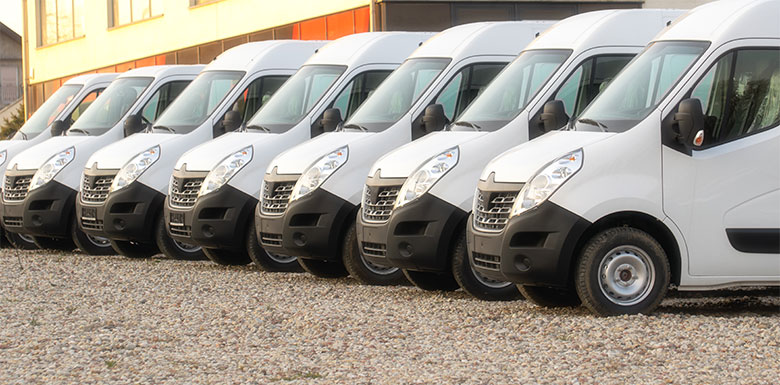What to know when buying a van for your business
 In this article
In this article
- Can I buy a van through my business?
- What are the tax benefits of buying a van through a limited company?
- Leasing vs buying a van outright
- Choosing between a new vs secondhand van
- Other factors to consider when buying a van for your business
- Choosing an electric, diesel, or petrol van
- Get the Trusted Trader logo on your new van
Whether you’re a builder who needs to transport tools, or a courier whose livelihood depends on having a vehicle, buying a van for your business is an absolute must – and buying a van through your company can be a very tax-efficient option.
However, before you start shopping around and picking the first van you like the look of, there are several things to consider, such as whether to buy your van or lease it instead, or whether or not you should opt for a new or a second-hand model..
These are important questions to ask, which is why we’ve examined the pros and cons of each option to help you decide which is best for your business.
Can I buy a van through my business?
Yes, it is possible to buy a van through your business once it’s set up, though the process through which you do this, and how much you can claim back on your van purchase, could differ depending on whether or not you operate as a sole trade or a limited company.
For example, buying a van through a limited company can be rather straightforward, whereas purchasing a van as a sole trade may require you to take out loans and work with an accountant to understand exactly how much you can claim back on the cost of your new van.
Regardless, the tax situation around van purchasing can be complex, so you should speak to your accountant before making any purchases. They’ll be able to tell you whether you should buy your van through your company and exactly how much relief you can claim it and other tax-deductible expenses.
And remember, all the paperwork must be in your company’s name and all the payments must go through your business bank account.
What are the tax benefits of buying a van through a limited company?
Starting with the benefits of purchasing a van through your limited company, investing in a van this way will help to save on the cost of your purchase.
This is because, unlike a car, vans count as plants and machinery for tax purposes, allowing you to claim up to 100% of the cost of your purchase against your capital allowance. Essentially, you can deduct the full price of the van from your company profits before calculating corporation tax.
On top of this, you can also claim the full VAT back from the cost of your van if your company is registered for VAT, and you may also be able to claim for other costs when using your work van, including:
- Vehicle insurance
- Fuel
- Repairs and servicing
- Parking
- Breakdown cover
- Vehicle licence fees
What are the downsides of buying a van through a limited company?
While the tax benefits for purchasing a van through your limited company are not to be sniffed at, one thing to be aware of is that, if you sell the van later, it will count as a company asset, meaning you’ll need to pay tax on the sale.
This means that you need to be very careful during the selling process to make sure that the work vehicle you buy qualifies as a van rather than a car. Fortunately, the government has a helpful list you can consult before you buy to make sure your new vehicle meets this criteria.
Using your van outside of work
If you also intend to use your work van for personal use, it can make the tax situation more complicated as it will count as a benefit-in-kind, and will therefore have implications for your personal tax situation.
Essentially, this means you’ll also only be able to claim a portion of the VAT back when you buy the vehicle, and if the company pays for fuel, that will also count as a benefit-in-kind and will increase the tax you owe.
Leasing vs buying a van outright
From here, the next thing to think about is whether you want to lease this vehicle or buy it outright, as there are advantages and disadvantages to both approaches:
The pros and cons of leasing a van
The main benefit of leasing a van is that almost all payments are wrapped into a simple monthly fee. You’ll have to pay a deposit, but then you know that things like insurance and maintenance are taken care of.
Alongside this, while you can’t claim for a leased car against your capital allowances (because it’s not a company asset), your rental payments can be treated as tax-deductible expenses, and you should be able to claim VAT back on these lease payments and any maintenance costs.
Finally, at the end of your lease period, you can typically either return the van, make a payment to own it outright or sign a contract for a new one with the company.
However, leasing your work van does have its downsides, such as restrictions on how much mileage you can do, any modifications you want to make your van, what you can use your van for, and the fact that once you sign the lease you won’t be able to end it early without additional costs.
It’s also important to note that not every leasing company offers the same package, so check the fine print before you sign.
The pros and cons of buying a van
In contrast to leasing a van, when it comes to buying a van outright, the main benefit is that you can use it as you please. There are no restrictions on mileage, and you can adapt it to hold any specialist equipment you need. And even if you use a finance deal or bank loan for your purchase, you will own the vehicle at the end of the arrangement.
As described above, the tax advantages can make buying a company van a sensible financial option. And if you can buy it outright up front, you’re likely to pay less overall as you won’t be charged interest.
However, you’ll need to think about and budget for things like insurance and maintenance. And if you buy a new van, the value of your company asset will depreciate from the moment you drive it off the forecourt, meaning you’ll likely get much less for it if you decide to sell it in the future.
Choosing between a new vs second-hand van
Should you decide to buy a van outright, you’ll need to decide whether or not you want to buy a new van or a second-hand model. You might feel that a new van is a safer investment, but buying a second-hand van does have its positives:
The pros and cons of buying a new van
When buying a new van, the obvious main advantage is that it’s had no previous owners, and all of its warranties are still valid. On top of this, you shouldn’t have to worry about any maintenance issues for a while, and maintenance costs should be lower overall.
However, buying a van new can be an expensive investment, especially if you’re unable to claim its full purchase cost back, and there is a chance you will have to wait for the model of van you’re interested in to come into stock before completing your purchase.
The pros and cons of buying a second-hand van
While second-hand vans have been pre-owned, they’re often much cheaper thanks to their depreciated value and the fact that you can typically haggle for a lower price than first advertised. There’s even the chance that you can increase the value of your van by building it out to carry specific equipment.
With that being said, second-hand vans obviously have a shorter lifespan due to their age, and maintenance costs tend to be higher and more regular, not to mention the fact that any initial warranties provided by the manufacturer may have run their course already.
Other factors to consider when buying a van for your business
Besides the important questions of how and what type of van to buy, there are numerous other factors you’ll need to bear in mind when owning and operating a work van that may impact your finances, such as restrictions on where you can park your van, and how to keep your van safe, as well as the following:
Insurance
Just like with a car, van insurance is a legal requirement for driving vehicles, as this financially protects you and your vehicle – as well as other drivers – in the event of an accident.
If the company owns your van, then your insurance will need to cover you for business use. This is sometimes known as commercial use or carriage of own goods. Alongside this, if you’re a courier or if you transport goods, you will need insurance that covers you for haulage use.
Vehicle excise duty
Much like insurance, you're legally required to pay road tax on your van annually or every six months.
If you pay annually, it will cost around £320, but if you split the payments, it will cost you £352 in total, making it cheaper to pay for the year in one go.
However, if you have an older van, you might get a discounted rate. You can check all the rates on HMRC's website.
Fuel costs
Your business can claim back VAT on any fuel that it pays for, which is exclusively business-related. In this circumstance, you should be able to claim back 100% of the VAT. But if your company pays for fuel and you use the van for personal trips, this is classed as a benefit-in-kind, and you’ll need to pay something called the Van Fuel Benefit Charge.
In the current tax year (2023-2024), this equates to £757.
To work out how much you’ll have to pay, you multiply this figure by your income tax band. For instance, a basic rate taxpayer would need to pay £151 a year.
However, if the vehicle is electric, you don’t need to pay this tax.
Choosing an electric, diesel, or petrol van
Last, but not least, when choosing your van, you’ll need to consider whether you want an electric, petrol, or diesel model, as the type you choose will have an impact on your fuel costs..
If you’re choosing between diesel and petrol, you can use our fuel calculator to see what the price difference is likely to be based on your normal usage, but please remember that the government is planning to ban the sale of new petrol or diesel vans from 2035.
And while this won’t necessarily impact your purchase now, it’s worth considering how other measures such as the ULEZ in London or the Clean Air Zone in Birmingham might affect you.
Electric vehicles, on the other hand, cost more to buy, but they’re generally cheaper to run than petrol or diesel cars. Whether this will suit you depends on whether there is a charging point at or near your home or business and how far you typically need to drive.
There are also useful grants that can slash the cost of a company van by 35%. This is capped at £2,500 for some small vans and £5,000 for larger vans. You can read the full details of the scheme at gov.uk.
Get the Trusted Trader logo on your new van
Hopefully, you should now have a much better idea of what to consider when purchasing a new van for your business.
Of course, owning a van is not enough to prove to your customers that you’re a skilled and experienced tradesperson, which is why you should also consider partnering with Which? Trusted Traders.
As a Trusted Trader, you’ll be put through a rigorous assessment process, at the end of which you’ll be able to display our Trusted Trader logo, which lets customers know that you’re a reliable expert in your field.
Not only that, but you’ll get access to your very own personal profile page to showcase your work and reviews to potential customers, a dedicated account manager to offer advice and support, and complaints assistance to handle any disputes.
Get in touch today to find out more about applying to our Trusted Trader scheme, and don’t forget to visit our advice guide hub for more informative articles like this one.




